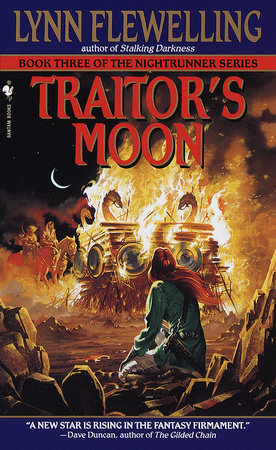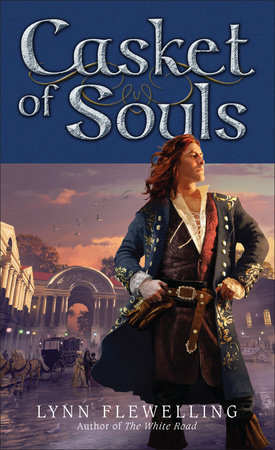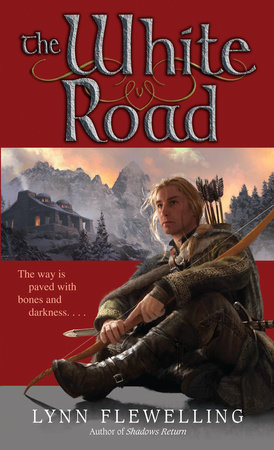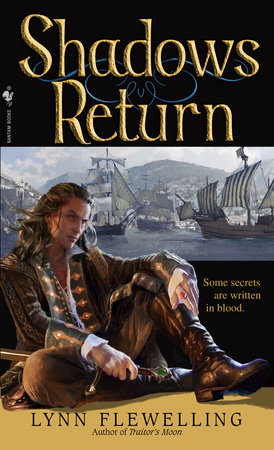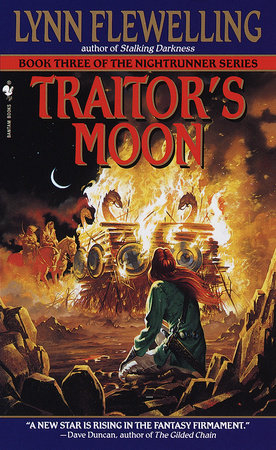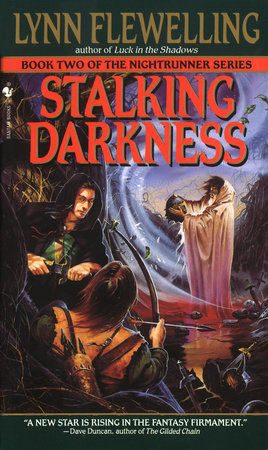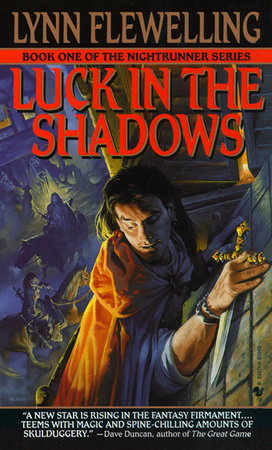Excerpt
Traitor's Moon
1
DARK HOPES
The sleet-laden wind buffeted Magyana, whipping wet strands free from the wizard’s thick white braid as she trudged across the churned ground of the battlefield. In the distance, the tents of her queen’s sprawling encampment billowed and creaked along the riverbank, black specters on a dun plain. In the makeshift corrals, the horses huddled together, their backs to the wind. The unlucky soldiers on sentry duty did the same, their green tabards the only spots of color against this grim palette.
Magyana pulled her sodden cloak more closely around her. Never in all her three hundred and three years had she felt the cold so keenly. Perhaps faith had kept her warm before, she reflected sadly, faith in the comfortable rhythms of her life, and faith in Nysander, the wizard who’d been a part of her soul for two centuries. This damnable war had robbed her of both, and more. Nearly a third of the Orëska House wizards were dead, centuries of life and learning snatched away. Queen Idrilain’s second consort and two younger sons had fallen in battle, together with dozens of nobles and countless common soldiers—sent by blade or disease down to Bilairy’s gate.
Magyana’s grief was mingled with resentment at the disruption of her orderly life. She was a wanderer, a scholar, a gatherer of wonders and tales. Only reluctantly had she taken Nysander’s place at the aging queen’s side.
My poor Nysunder. She wiped a wind-smeared tear from her cheek. You would have relished all this, seen it as a great game to be won.
So here she was, winter-locked in the wilds of southern Mycena, a nation once more bathed in the blood of two bellicose neighbors. Plenimar stretched greedy talons westward toward Skala’s borders and north to the fertile freeholdings along the Gold Road. This harsh second winter had slowed the fighting, but as the days now slowly lengthened toward spring, the queen’s spies brought daily reports of the unthinkable; their Mycenian allies were considering surrender.
And no wonder, Magyana thought, reaching the outskirts of the camp at last. It had been just five days since the last battle. These ravaged fields where farmers had once cut sheaves of grain were sown now with a crueler crop: shredded banners, broken buckles, arrow heads overlooked by scavenging camp followers, and the occasional pitiful scrap of human remains, frozen too hard for even the ravens to peck out. It would yield a bitter spring harvest with the thaw, one she doubted any of them would be here to witness, now that things had gone so horribly wrong.
The Plenimarans had surprised them just before dawn. Throwing on her armor, Idrilain had rushed to rally her troops before Magyana could reach her. One side of the queen’s corselet had been left unbuckled, and during the ensuing battle a Plenimaran arrow found the gap, piercing Idrilain’s left lung. She survived the extraction, but the wound quickly festered. Plenimaran archers dipped their arrowheads in their own excrement before a battle.
Since then, a host of drysian healers had exerted their combined skills to keep her alive while the wound putrefied and fevers melted the flesh from her bones. It was agony, watching Idrilain fight this silent battle, but she refused to order her own release.
“Not yet. Not as things are,” she’d groaned, clutching Magyana’s hand as she panted and shook and laid her plans.
Reaching the queen’s great pavilion, Magyana sent up a silent prayer. O Illior, Sakor, Astellus, and Dalna, now is the hour! Give our queen strength enough to see our ruse through.
A guard lifted the flap for her, and she stepped into the stifling heat beyond.
Huge tapestries suspended from the ridgepoles overhead enclosed the audience chamber, already crowded with officers and wizards gathered by the queen’s summons. Magyana took her place to the left of the empty throne, then nodded to Thero, her protégé and coconspirator, who stood nearby. He bowed, his calm, aesthetic face betraying nothing.
The tapestries behind the chair parted, and Idrilain entered leaning on the arm of her eldest son, Prince Korathan, and followed by her three daughters. All but plump Aralain were in uniform.
Idrilain took her seat and her heir, Phoria, placed the ancient Sword of Ghërilain unsheathed across her mother’s knees. Bold in war, wise in peace, Idrilain had wielded the ancient blade with honor for more than four decades. Now, unbeknownst to all but her closest advisers, she was too weak to lift it unaided.
Her thick grey hair fell smoothly over her shoulders beneath her golden circlet, hiding her thin neck. Soft leather gauntlets covered withered hands. Her wasted body was muffled in robes to hide the extent of her decline. The drysian’s infusions blunted the pain enough not to tax her exhausted heart, but there were limits to even their powers. It took Thero’s magic to limn the semblance of flesh and color in the queen’s cheeks and lend false power to her voice. Only her pale blue eyes were unchanged, sharply alert as an osprey’s.
The effect was flawless. The pity of it was that such deception must be practiced on Idrilain’s own children.
The queen’s two consorts had given her three children each, the two triads as different as the men who’d fathered them. The elder three—Princess Phoria, her twin Korathan, and their sister Aralain, were tall, fair, and solemn.
Klia, the youngest and sole survivor of the second three, had the same handsome features, chestnut hair, and ready wit as the father and two brothers for whom she still wore a black baldric. Of these six, it had always been the eldest and youngest girls whom the Orëska wizards watched most closely.
Skilled and fearless in battle, Phoria had risen through the ranks of the Queen’s Horse Guard to High Commander of the Skalan Cavalry. Nearing fifty now, she was as renowned in military circles for her tactical innovations as she was at court for her blunt speech and ill-starred barrenness. While her merits as a warrior might have been sufficient for the crown in her great-grandmother’s day, times had changed and Magyana was not the only one to fear that Phoria lacked the vision to rule a nation touched by the intricacies of the wider world.
Just before his death Nysander had also hinted to Magyana of a breach between heir and queen, but was forestalled by some oath from revealing more.
“We are the oldest of the Orëska wizards now, my love. No one knows better than we how precariously the common good balances on the edge of Ghërilain’s Sword,” he’d warned. “Keep close to the throne, and to all those who might one day sit upon it.”
Magyana turned her attention back to Klia and felt a familiar surge of fondness. At twenty-five, she not only commanded a full squadron of Queen’s Horse, but had demonstrated a talent for diplomacy, as well. It was no secret that a good many Skalans wished she was the firstborn.
Idrilain raised her hand and the assembly fell silent. “We will lose this war,” she began, her voice a husky wheeze.
Magyana silently guided a stream of her own life force into the woman’s ravaged body. The connection brought a backwash of pain, threading her veins with the dull crush of Idrilain’s suffering and exhaustion. Magyana forced herself to breathe slowly, letting her mind rise above it and retain its focus. Across the room, Thero was doing the same.
“We will lose this war without Aurënen,” Idrilain continued, sounding stronger. “We need the Aurënfaie’s strength, and their wizards to turn the tide of Plenimaran necromancy. And if Mycena falls, we will need Aurënfaie trade, as well: horses, weapons, food.”
“We’ve done well enough without the ’faie,” Phoria retorted. “Plenimar hasn’t managed to push us back from the Folcwine, for all their necromancers and abominations.”
“But they will!” Idrilain croaked. An attendant offered her a goblet but she waved it away; no one must see the tremor in her hands. “Even if we manage to defeat them, we shall need the Aurënfaie after the war. We need their blood mingled with our own again.”
She gestured imperiously for Magyana to continue.
“The power of wizardry came to our people by the mingling of our two races, human and Aurënfaie,” Magyana began, reminding those who needed reminding of their own history. “It was the Aurënfaie who taught our first wizards the ways of Orëska magic.” She turned to the Royal Kin. “You yourselves still carry the memory of that blood, the legacy of Idrilain the First and her Aurënfaie consort, Corruth í Glamien. Since his murder and the closing of Aurënen’s borders against us three centuries ago, few Aurënfaie have come to Skala and so their legacy dwindles among us. Fewer wizard-born children are presented at the Orëska House each year, and the abilities of the young ones are often limited. Because wizards cannot procreate, there is no remedy save a renewed commerce between our two lands.
“The Plenimaran’s attack on the Orëska House cut down some of our best young wizards before the war had truly started. The fighting since has thinned our ranks still further. There are empty beds in the Orëska’s apprentice hall now, and for the first time since the founding of the Third Orëska in Rhíminee, two of the House’s towers stand empty.”


